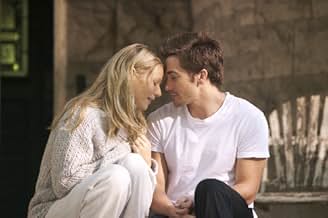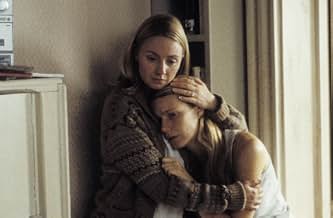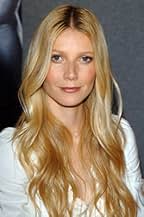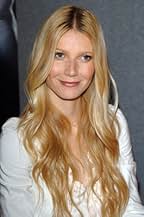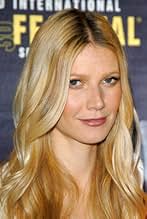Die kürzlich verstorbene Tochter eines brillanten, aber psychisch gestörten Mathematikers versucht, ihr mögliches Erbe in den Griff zu bekommen: seinen Wahnsinn.Die kürzlich verstorbene Tochter eines brillanten, aber psychisch gestörten Mathematikers versucht, ihr mögliches Erbe in den Griff zu bekommen: seinen Wahnsinn.Die kürzlich verstorbene Tochter eines brillanten, aber psychisch gestörten Mathematikers versucht, ihr mögliches Erbe in den Griff zu bekommen: seinen Wahnsinn.
- Auszeichnungen
- 4 Gewinne & 6 Nominierungen insgesamt
- Limo Driver
- (as Tobiacz Daszkiewicz)
- University Friend
- (as C Gerod Harris)
- American Student
- (Nicht genannt)
- Wake Guest
- (Nicht genannt)
Empfohlene Bewertungen
The assembled supporting cast is impressive in name; however, Sir Anthony Hopkins is solid, but not great in the relatively small, but crucial role as Paltrow's once genius, then insane, now dead father. His influence on her life is beyond question and how she deals is the heart of the story. Jake Gyllenhaal, although a fine actor, is totally miscast as Hopkins' former student who tries to secure the legacy. Hope Davis is perfect as the irritating sister of Paltrow who has "been working 14 hour days" for 5 years while Paltrow cared for dear old nutty dad.
What prevents the film from being great is that it never decides what it is about. It is a film about a math genius (or two) but it shows almost no math. Is it a film about genius? Is it about insanity? Is it about caring for an elderly parent? Is it a film of self-discovery? All of these are touched on, but none are hit head-on. It is a fine film, definitely worth seeing, but it will probably leave you feeling a bit empty.
The flashbacks cut effectively back and forth and smooth out where each character is coming from.
"Catherine," the daughter of a brilliant mathematician who is somewhat modeled on John Nash's struggles with madness which were portrayed in "A Beautiful Mind," is still the focal point of attention. But with the other characters fleshed out more Gwyneth Paltrow has more to naturalistically react to than the stage actresses (I saw it on Broadway with a mercurial Anne Heche). Paltrow brings unexpected fragility to the role and makes her sarcastic accusations to her sister come out of personal pain and not just spitefulness. You really see that she is emotionally ravaged from putting her life and mind on hold for a father with a very strong personality.
Anthony Hopkins is unusually paternal as the father and you understand her attractions and fear of him, as well as why the sister had to flee how insecure she felt there, as Hope Davis manages to breathe some life into a strident character. We see very clearly the demands of being a caregiver to a legend. Unlike in "Iris" at the end of careers, we do ache at the sacrifices the young caregiver has made and how this claustrophobic existence has led to her own crippling doubts about her work, her life and her sanity.
Jake Gyllenhaal is the hunkiest, most adorable, rock 'n' rollin' math graduate student since Matt Damon in "Good Will Hunting" and could help increase math enrollments around the country. But as irresistible as he is, and their relationship is literally more believably fleshed out as young people than in the play, we also can share Paltrow's suspicion of him. But we see more of his activities, as the film opens up the play, so we too clearly know before she that he has regained in our credibility as he seeks his proof. I don't mind that the film adds to the romantic aspects and drawn out coda as I thought the play tempted unfulfillingly in that direction and it is a means to help her regain the multiple meanings of proof -- as evidence, as trust, as confidence.
Director John Madden keeps the camera moving actively during long dialog interchanges, reflecting "Catherine"s agitated state of mind. The house and academic setting well establish the atmosphere, particularly when there's more people around, though some of the outdoor shots seemed like filler.
The score is occasionally intrusive, but the concluding voice-over is even more annoying and unnecessary.
This is a compelling portrayal of the mathematical obsession. It's not as flashy or romantic as cinema tries to dress up math sometimes. It is a bit sad. Paltrow does great work following Hopkins. She shows that she's not simply a romantic lead. It's a compelling character study.
In the end, this film is all about Gwyneth Paltrow.
She is on screen at least 80% of this film. Her character dances between mourning, anger, remorse, confusion, fear, vulnerability, sadness, and just a little bit of love. There are very dramatic changes in emotion from moment to moment, and Paltrow pulls it off brilliantly.
Sir Anthony Hopkins role, while relatively small, is crucial to the film. His performance was good, but not great. But it didn't really matter, as Proof is all about Paltrow. Hope Davis and Jake Gyllenhaal also gave solid performances, but their as with Hopkin's role were really nothing more than support Paltrow.
The biggest disappointment for me was the almost total lack of any 'real' mathematics. For a film that revolves around brilliant mathematical proofs, there's an almost painful scarcity of and real math in the film. There are shots of seemingly random equations scrawled across paper or a blackboard, and the odd conversation making reference to some known mathematical law or theorem, but I would have liked more.
IF you want a happy film, go see something else. If you want a mindless film, go see something else. If you want a typical love story, go see something else. If you want an intelligent well written and presented story of substance involving a a character experiencing a roller-coaster of emotions, Proof may be for you.
Wusstest du schon
- WissenswertesGwyneth Paltrow reprised the role of Catherine that she had played on stage in London's West End.
- PatzerThe daughter talks about how the father was looking for a message from aliens in the Dewey decimal call numbers on the books from the University of Chicago library. The University of Chicago uses Library of Congress call numbers, which begin with letters, not numbers.
- Zitate
Catherine: [Reading Robert's Notebook] "Let X equal the quantity of all quantities of X. Let X equal the cold. It is cold in December. The months of cold equal November through February. There are four months of cold, and four of heat, leaving four months of indeterminate temperature. In February it snows. In March the Lake is a lake of ice. In September the students come back and the bookstores are full. Let X equal the month of full bookstores. The number of books approaches infinity as the number of months of cold approaches four. I will never be as cold now as I will in the future. The future of cold is infinite. The future of heat is the future of cold. The bookstores are infinite and so are never full except in September..."
- VerbindungenFeatured in The 63rd Annual Golden Globe Awards 2006 (2006)
- SoundtracksEl chocha loca
(2002)
Written by Claudio Quattrocchi
Performed by Loca
Published by Big Tiger Music (BMI)
Courtesy of Lovecat Records
By Arrangement with Ocean Park Music Group
Top-Auswahl
- How long is Proof?Powered by Alexa
Details
- Erscheinungsdatum
- Herkunftsland
- Offizieller Standort
- Sprache
- Auch bekannt als
- Der Beweis - Liebe zwischen Genie und Wahnsinn
- Drehorte
- Produktionsfirmen
- Weitere beteiligte Unternehmen bei IMDbPro anzeigen
Box Office
- Budget
- 20.000.000 $ (geschätzt)
- Bruttoertrag in den USA und Kanada
- 7.535.331 $
- Eröffnungswochenende in den USA und in Kanada
- 193.840 $
- 18. Sept. 2005
- Weltweiter Bruttoertrag
- 14.189.860 $
- Laufzeit1 Stunde 40 Minuten
- Farbe
- Sound-Mix
- Seitenverhältnis
- 2.35 : 1



